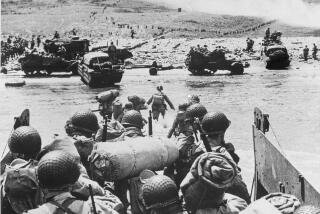A Vivid, Skillful Recounting of the Nazi War Machine in Defeat
SCENES FROM THE END: The Last Days of World War II in Europe
by Frank E. Manuel
Steerforth Press
$20, 144 pages
*
To read this passionate, slender book is to be transported 55 years back in time to the turmoil of a Europe upheaved by the defeat of Nazi Germany. Frank E. Manuel, the distinguished historian of ideas, was a 34-year-old counterintelligence officer in the U.S. Army when the war ended. “Scenes From the End” reads as if it was written right then, on the spot, without the reflection--and, often, as a result, the emotional distancing--that the passage of time brings to one’s memories.
Fluent in German, French and Yiddish, Manuel worked as a prisoner-of-war interrogator, interviewing captured German generals, German soldiers, the dispossessed and starving Jews and even Adm. Miklos Horthy, the pro-Nazi regent of Hungary. He traveled the German countryside and lived, gloomily, for a time in the vast, destroyed city of Leipzig.
And, indeed, as he tells us in his poignant story, this book was written mostly then, in notes to himself and in letters to his wife.
“Fact and occasional fantasy,” Manuel writes, “rub shoulders in my story of the collapse of the Reich, seen through a tiny peephole. . . .
“To blur the line,” he continues, “between invention and recollection, fantasy and memory, was not my intent; it just happened that way. The result is a hybrid far more common among historians since Herodotus than we professionals admit when we don our academic gowns.”
In Manuel’s skilled hands, this method renders the spring and summer of 1945 among the ruins of the Third Reich with a shocking vividness. “Today,” he writes, “I feel ashamed of verdicts pronounced in the heat of battle or at the sight of human atrocities. I regret the summary judgments that poured out of me and the sentiments of superior virtue that besmirch all victors.”
Perhaps he shouldn’t be quite so rueful, for the sights he saw and the tales he heard provoked in him at the time reactions that were only, and fully, human. In Weilheim he describes an antiquarian’s house, where shelved volumes by Goethe, Schiller and Lessing “in rare binding” looked down on a crowd of captured German generals. What did these men talk about? About how they didn’t know about, or weren’t responsible for, the barbarism of the Nazi regime.
“We must expiate our crimes,” one said. “We let ourselves be betrayed by this gang. But what could we do? I was unemployed in the ‘20s. An engineer. And so, for lack of a job, I joined the army.”
“And became a general?” Manuel sarcastically asks.
“We have been defending Europe against the Asiatic beasts [the Russians],” says another. “Now come the Americans and shoot us in the back.”
The “remorse and regret” of these generals “were entirely in the military universe of discourse,” Manuel writes. “They were at fault for not driving on England immediately after” the British evacuated Dunkirk at the fall of France in 1940. Where battlefield tactics weren’t concerned, Manuel observes, the generals were coolly unconcerned. “Dachau is another department,” another general tells him. “No one ever visited concentration camps.”
The Hungarian Horthy apparently figured out that Manuel was Jewish, for he told him how many Jews he had saved. Manuel dogged the admiral. When he knew the war was lost, why did he play Hitler’s game as long as he did and why did he sacrifice 12 or 13 Hungarian divisions to defend the retreating Germans from the advancing Russians?
“The regent of Hungary shrugged his shoulders,” Manuel writes, “like so many German privates to whom I had posed the same fatuous question, and the same long-suffering look imprinted itself upon his face.
‘Was konnte ich denn machen? [What could I do?] I was the helpless Fuhrer of a little state.’ ”
Manuel is now in his 80s, and those he interviewed are either gone or octogenarians. After 50 years of democracy, the burden of the past does not lie on Germany so heavily. But, not so long ago, it did. “Scenes From the End” is a riveting memoir that brings that tormented past rudely and vividly into the more placid present.
More to Read
Sign up for our Book Club newsletter
Get the latest news, events and more from the Los Angeles Times Book Club, and help us get L.A. reading and talking.
You may occasionally receive promotional content from the Los Angeles Times.






